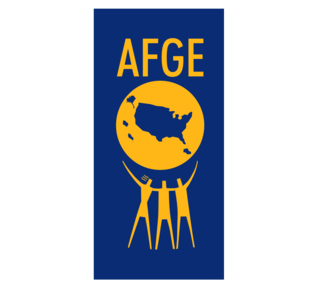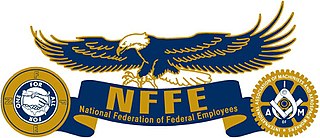Related Research Articles

The American Federation of Government Employees (AFGE) is an American labor union representing over 750,000 employees of the federal government, about 5,000 employees of the District of Columbia, and a few hundred private sector employees, mostly in and around federal facilities. AFGE is the largest union for civilian, non-postal federal employees and the largest union for District of Columbia employees who report directly to the mayor. It is affiliated with the AFL–CIO.

The United States Office of Personnel Management (OPM) is an independent agency of the United States government that manages the United States federal civil service. The agency provides federal human resources policy, oversight, and support, and tends to healthcare (FEHB), life insurance (FEGLI), and retirement benefits for federal government employees, retirees, and their dependents.
The excepted service is the part of the United States federal civil service that is not part of either the competitive service or the Senior Executive Service. It allows streamlined hiring processes to be used under certain circumstances.

The Combined Federal Campaign (CFC) is the workplace giving program of the federal government of the United States. The program is authorized by executive order 12353 of March 23, 1982, and is overseen by the United States Office of Personnel Management (OPM). Issued by President Reagan, the order states that a CFC objective is "to lessen the burdens of government and of local communities in meeting needs of human health and welfare ..." According to OPM's website, the mission of the CFC "is to promote and support philanthropy through a program that is employee focused, cost-efficient, and effective in providing all federal employees the opportunity to improve the quality of life for all".

The Senior Executive Service (SES) is a position classification in the United States federal civil service equivalent to general officer or flag officer rank in the U.S. Armed Forces. It was created in 1979 when the Civil Service Reform Act of 1978 went into effect under President Jimmy Carter.
The General Schedule (GS) is the predominant pay scale within the United States civil service. The GS includes the majority of white collar personnel positions. As of September 2004, 71 percent of federal civilian employees were paid under the GS. The GG pay rates are identical to published GS pay rates.
The Federal Employees Pay Comparability Act of 1990 or FEPCA is a United States federal law relating to the salaries for employees of the United States Government. In the 1980s, salaries for civil servants in the executive branch had fallen behind private sector pay. FEPCA was enacted to provide guidelines to achieve pay comparability between Federal and non-Federal jobs. FEPCA was enacted as Section 529 of the Treasury, Postal Service and General Government Appropriations Act, 1991.
The United States federal civil service is the civilian workforce of the United States federal government's departments and agencies. The federal civil service was established in 1871. U.S. state and local government entities often have comparable civil service systems that are modeled on the national system to varying degrees.

The National Treasury Employees Union (NTEU) is an independent labor union representing 150,000 employees of 35 departments and agencies of the United States Government. The union specializes in representation of non-supervisory federal employees in every classification and pay level in civilian agencies.
Executive Schedule is the system of salaries given to the highest-ranked appointed officials in the executive branch of the U.S. government. The president of the United States appoints individuals to these positions, most with the advice and consent of the United States Senate. They include members of the president's Cabinet, several top-ranking officials of each executive department, the directors of some of the more prominent departmental and independent agencies, and several members of the Executive Office of the President.

The National Federation of Federal Employees (NFFE) is an American labor union which represents about 100,000 public employees in the federal government.
The Federal Wage System (FWS) in the United States was developed to make the pay of federal blue-collar workers comparable to prevailing private sector rates in each local wage area. The FWS is a partnership worked out between the Office of Personnel Management (OPM), other Federal agencies, and labor organizations.
Janice Rachel Lachance is an American attorney and government official working as the president of the American Society for Public Administration. She was previously the 13th chief executive of the Special Libraries Association and director of the United States Office of Personnel Management.

According to the United States Office of Government Ethics, a political appointee is "any employee who is appointed by the President, the Vice President, or agency head". As of 2016, there were around 4,000 political appointment positions which an incoming administration needs to review, and fill or confirm, of which about 1,200 require Senate confirmation. The White House Presidential Personnel Office (PPO) is one of the offices most responsible for political appointees and for assessing candidates to work at or for the White House.
The Office of Personnel Management data breach was a 2015 data breach targeting Standard Form 86 (SF-86) U.S. government security clearance records retained by the United States Office of Personnel Management (OPM). One of the largest breaches of government data in U.S. history, the attack was carried out by an advanced persistent threat based in China, widely believed to be the Jiangsu State Security Department, a subsidiary of the Government of China's Ministry of State Security spy agency.

Jeffrey David Cox is the former National President of the American Federation of Government Employees (AFGE), AFL-CIO who resigned in February of 2020, amid allegations of misusing union funds and sexual harassment.

Victoria Ann Lipnic is an American lawyer and public figure. She served in multiple senior United States government positions. She was Commissioner of the U.S. Equal Employment Opportunity Commission (EEOC), nominated to two terms by President Barack Obama, 2010 – 2020.) She served as Chair (Acting) of the EEOC under President Donald J. Trump from 2017 – 2019. Prior to her appointments to the EEOC, she was Assistant Secretary of Labor under President George W. Bush. The United States Senate confirmed her unanimously to each of these positions.
The President's Pay Agent consists of the Secretary of Labor and the Directors of the Office of Management and Budget (OMB) and the Office of Personnel Management (OPM). The Pay Agent's responsibility, pursuant to 5 U.S.C. 5304(d), as amended, approves locality and pay adjustments for federal employees as recommended by the Federal Salary Council.

George Nesterczuk is an American political advisor, consultant, and government official. He was nominated by President Donald Trump in June 2017 to become the Director of the United States Office of Personnel Management, but he later withdrew his candidacy over potential delays in the confirmation process.
A Schedule F appointment was a job classification in the excepted service of the United States federal civil service that existed briefly at the end of the Trump administration during 2020 and 2021. It would have contained policy-related positions, removing their civil service protections and making them easy to dismiss. It was never fully implemented, and no one was appointed to it before it was repealed at the beginning of the Biden administration. Trump has stated his intention to reinstate the Schedule F provisions at the beginning of his second term.
References
- ↑ Geographic Boundaries of Locality Pay Areas, OPM.gov. Accessed 27 October 2020.
- ↑ "Trump Announces Intent to Nominate and Appoint Personnel to Key Administration Posts". whitehouse.gov . Retrieved December 23, 2018– via National Archives.
- ↑ Erich Wagner, Salary Council Chairman Resigns in Protest of Trump Order Politicizing Federal Workforce, 26 October 2020, Politico. Accessed 27 October 2020.
- ↑ Emily Czachor, Trump Official Resigns Over Executive Order 'Smokescreen' That Asks for 'Political Loyalty' From Advisers, 26 Oct. 2020, Newsweek . Accessed 26 October 2020.
- ↑ Ronald Sanders, , 26 October 2020, letter of Ronald Sanders. Accessed 27 October 2020.